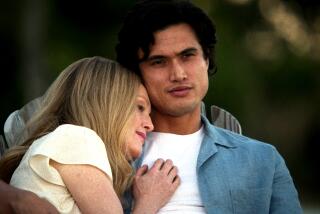Today’s Topic
- Share via
Whenever a popular public figure falls from grace, there is always one inevitable question: How could it happen? How could someone rich, famous, powerful and widely admired allow drugs, sex, scandal or crime to ruin their life? The answer, many experts say, is simple. We expect far too much from our public figures and we too easily confer heroic status on basically ordinary people, many of whom tend to have the same character flaws as the rest of us.
Still, the sight of a sullen O.J. Simpson sitting in a courtroom facing murder charges, or President Clinton facing sexual-harassment charges, or baseball star Dwight Gooden coping with drug problems leaves many wondering if there are any true heroes in our society.
In today’s Youth Opinion, some youngsters remind us that there are people worthy of unbridled respect and admiration. Not surprisingly, their heroes are not likely to appear on some artificial roster of the “Ten Most Admired Men or Women in America.”
Their heroes are real people: the folks next door, the unheralded leaders who have taken a stand against drugs or prejudice, pioneers in a field, and even their parents.
So, why is it that in the public’s perception the lines often seem blurred between heroes, role models and celebrities? Why are many of our so-called heroes actors and athletes instead of social workers and teachers?
“One factor is the media and a culture that defines what a perfect person is,” says Leo Braudy, author of “The Frenzy of Renown: Fame and Its History.” “We confuse fame with heroism. There is a desire to admire others but whether someone we admire is an actual hero is another question.
“Heroes are often very different; they do strange and historic things,” adds Braudy. “A hero is someone who accomplishes something for the community. Many heroes are anonymous.” Adds Charles Adams, an English professor at Whittier College, “There is a difference between heroism and just being famous. Heroes must have a social consciousness. They must have the desire to transcend the mundane in our existence in some positive sense.
“I don’t think a hero needs to be a perfect being,” Adams says. “I don’t think a role model needs to be a perfect being. That’s asking a bit much.”
Yet, Americans tend to demand perfection of their public figures. They want them to be heroes and role models, paragons of our society. Historically, it’s an impossibility.
“Any kind of honest assessment shows heroes are anything but role models,” says Michael Near, an English professor at Occidental College. “We live in an era of metaphor and representation. Rather than looking at the circumstances in front of us, we fictionalize the reality around us. Someone like O.J. Simpson is the product of our culture. We’re creating him as someone larger than life.”
In fact, the experts remind us, heroes rarely are larger than life. “To be famous doesn’t require anything good about you at all,” Adams says. “When we think of heroes, we think of someone having achieved something good.”
More to Read
Sign up for Essential California
The most important California stories and recommendations in your inbox every morning.
You may occasionally receive promotional content from the Los Angeles Times.













